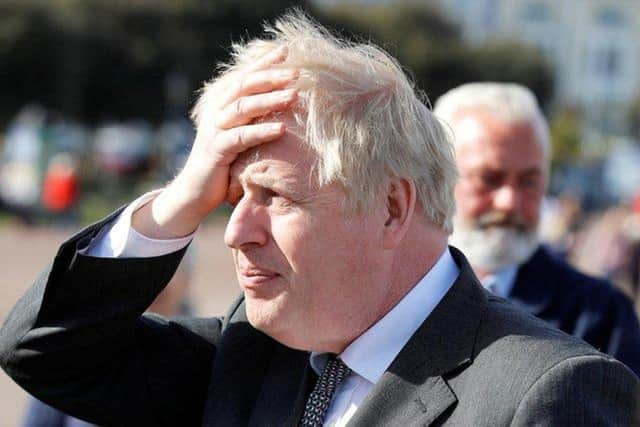Downing Street parties: What are the key findings of Sue Gray’s partygate report?
However, the decision of the Met Police to launch an investigation means this is more of an “update”, rather than the comprehensive document initially expected.
Ms Gray outlined her general findings after looking into 16 alleged gatherings in Downing Street and Whitehall.
Advertisement
Hide AdAdvertisement
Hide AdPolice are now investigating 12 of these, including an alleged gathering in the Prime Minister’s Downing Street flat on November 13, 2020, as well as a party in the No.10 garden on May 20 that year.


Two parties held by Downing Street staff the night before Prince Philip's funeral last year are also under investigation, alongside a gathering in the Cabinet room on June 19, 2020, on Boris Johnson’s birthday.
Three of the alleged events in Ms Gray’s report were not previously publicly known about.
What did the report find?
Ms Gray’s report has seven general findings. In full, these are:
- Against the backdrop of the pandemic, when the Government was asking citizens to accept far-reaching restrictions on their lives, some of the behaviour surrounding these gatherings is difficult to justify;
- At least some of the gatherings in question represent a serious failure to observe not just the high standards expected of those working at the heart of Government, but also of the standards expected of the entire British population at the time;
- At times it seems there was too little thought given to what was happening across the country in considering the appropriateness of some of these gatherings, the risks they presented to public health and how they might appear to the public. There were failures of leadership and judgment by different parts of No.10 and the Cabinet Office at different times. Some of the events should not have been allowed to take place. Other events should not have been allowed to develop as they did;
- The excessive consumption of alcohol is not appropriate in a professional workplace at any time. Steps must be taken to ensure that every Government department has a clear and robust policy in place covering the consumption of alcohol in the workplace;
Advertisement
Hide AdAdvertisement
Hide Ad- The use of the garden at No 10 Downing Street should be primarily for the Prime Minister and the private residents of No 10 and No 11 Downing Street. During the pandemic it was often used as an extension of the workplace as a more Covid-secure means of holding group meetings in a ventilated space. This was a sensible measure that staff appreciated, but the garden was also used for gatherings without clear authorisation or oversight. This was not appropriate. Any official access to the space, including for meetings, should be by invitation only and in a controlled environment;
- Some staff wanted to raise concerns about behaviours they witnessed at work, but at times felt unable to do so. No member of staff should feel unable to report or challenge poor conduct where they witness it. There should be easier ways for staff to raise such concerns informally, outside of the line management chain;
- The number of staff working in No 10 Downing Street has steadily increased in recent years. In terms of size, scale and range of responsibility it is now more akin to a small Government department than purely a dedicated Prime Minister’s office. The structures that support the smooth operation of Downing Street, however, have not evolved sufficiently to meet the demands of this expansion. The leadership structures are fragmented and complicated and this has sometimes led to the blurring of lines of accountability. Too much responsibility and expectation is placed on the senior official whose principal function is the direct support of the Prime Minister. This should be addressed as a matter of priority.
Ms Gray concluded “a number of these gatherings should not have been allowed to take place or to develop in the way that they did”.
She added: “There is significant learning to be drawn from these events which must be addressed immediately across Government.
"This does not need to wait for the police investigations to be concluded.”
What is missing from the report?
In short, a lot.
Ms Gray makes clear it is not her place to decide whether the law was broken.
She said the police investigation “necessarily means that I am extremely limited in what I can say about those events and it is not possible at present to provide a meaningful report setting out and analysing the extensive factual information I have been able to gather”.
Advertisement
Hide AdAdvertisement
Hide AdEven for those four events not covered by the police probe, Ms Gray said she had decided “not to publish factual accounts” as “I do not feel that I am able to do so without detriment to the overall balance of the findings”.
She considered waiting until the conclusion of the police investigation before publishing anything.
However, given the widespread public interest and to avoid further delay, Ms Gray decided to set out some general findings now.
She said: “I have not made comment on whether individual gatherings were in line with the relevant guidance and regulations in place at the time.
"I did not judge it appropriate to do so given the police investigation that is now underway.”
What happens now?
Mr Johnson has promised a shake-up in the wake of the report, including a commitment to create an Office of the Prime Minister with a permanent secretary to lead No.10.
His own fate is largely in the hands of Tory backbenchers. Will more now decide to submit letters of no-confidence in his leadership?
Meanwhile, the police investigation continues, with officers sifting through more than 300 photos and 500 pieces of paper.
Comments
Want to join the conversation? Please or to comment on this article.

